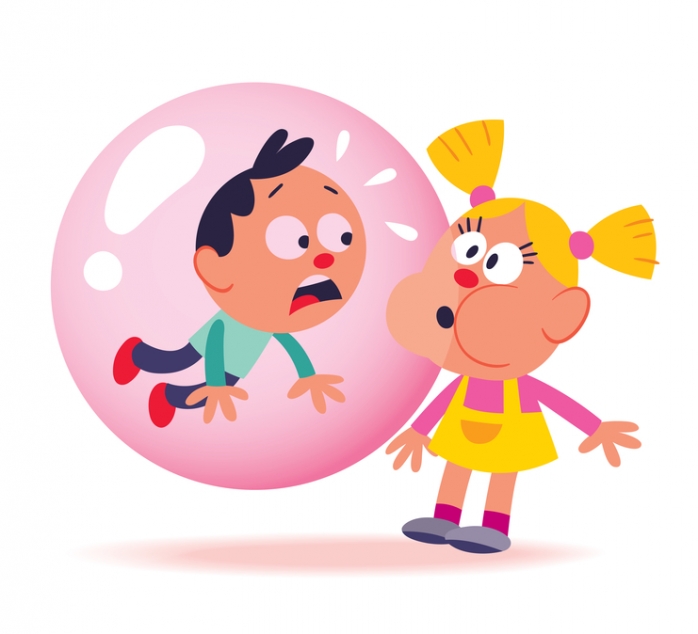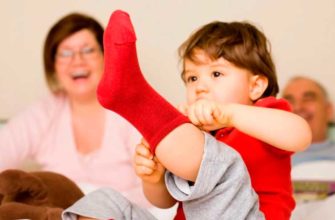Many children love chewing gum and are ready to chew it for hours. However, most parents have a negative attitude towards her. Adults believe that because of the chewing gum fillings fly out of the teeth, and after accidental ingestion it will not be digested. Are such concerns truly valid?

Benefit
Chewing gum is not the most useful product, but it cannot be called absolutely harmful either. With moderate consumption, this delicacy even has a beneficial effect on the body. Therefore, sometimes you can still pamper the baby.
The process of chewing gum causes in the child's body the same reflexes that arise when eating ordinary food:
- Strengthening salivation. Along with saliva, food residues are removed from the teeth. This prevents the formation of plaque, in which bacteria multiply.
- Recovery of acid-base balance. After eating, the level of acidity in the oral cavity rises. A favorable environment is created for the propagation of harmful microorganisms that destroy teeth and provoke the development of caries. The pH level is restored on its own, but increased salivation accelerates this process.
- Stimulating the production of gastric juice. It is necessary for the digestion of all food entering the body. If the gastric juice is not enough, digestion problems occur, stool is broken, pain and discomfort in the abdomen, nausea appear. It follows the rule that you can chew only after eating, so that there is something to digest.
- Strengthening the jaw joint. Some doctors recognize this effect as positive. In their opinion, modern food provides an insufficient load on the jaw. To increase it, it is useful to chew a little gum. But chewing gum can be replaced with carrots, cucumbers or apples. It is not only healthier, but also tastier.
Harm
With improper and too frequent use of chewing gum, all the positive effects begin to work to the detriment. In the functioning of the child's body there are violations:
- Constant dry mouth, "jams" in the corners of the lips, causing discomfort and pain when eating. Increased salivation is beneficial. However, the body can get used to the fact that this process is stimulated by chewing gum. In this case, the self-production of saliva will stop.
- The development at an early age of gastritis and stomach ulcers, requiring serious treatment. If a child chews gum on an empty stomach, then the entire volume of gastric juice, which is released at the same time, is useless for digestion. Being caustic acid, it begins to corrode the delicate gastric mucosa.
- Teeth loose and malocclusion. Some experts consider the increased load on the jaw joint, which creates chewing gum, useful, but others insist on the opposite. The explanation is as follows: if the chewing is too active, the child’s fragile teeth begin to loosen and bend. As a result, you have to turn to the orthodontist, put braces on the child, and also resort to other expensive procedures. If the child has fillings, then they can break down or fly out under the mechanical action of the gums, while chewing gum.
- Chewing gum does not have nutritional value - its composition: these are gum, artificial sweeteners, flavorings, colorants, stabilizers, emulsifiers and wax.
- Chewing gum does not replace a toothbrush and does not protect against caries. And chewing gum with sugar, on the contrary, contributes to the destruction of fragile children's tooth enamel.
The common opinion of parents that swallowed chewing gum “sticks together the intestines” is not far from the truth. Although the gum does not stick to the walls of the intestine, it settles in it. It it is not digested, it causes malfunctions of the stomach, and it takes time to remove it from the body naturally. If the baby swallows several chewing gums at once, they will accumulate in the intestine and, possibly, cause its obstruction. You should also be afraid that the child may choke on chewing gum. Therefore, try to exclude such situations, and just do not give your child chewing gum up to 5-6 years.
According to the observations of neurologists, in babies who use gum without restrictions, there are more often pronunciation defects and speech delays. If a child suffers from allergies, then chewing gum can provoke an exacerbation of the symptoms of this disease. It contains many chemicals. Some of them are equated with strong allergens. The greatest danger is chewing gum with a sharp taste, smell and bright color.
At what age can chewing gum be given to children?
Even though the chewing gum has its positive aspects, it can be given to children over 6 years old, only immediately after eating and no longer than 10 minutes. Chewing gum is not a treat, but uncontrolled chewing will translate all the pros to cons.
How to chew gum so that it does not harm your health?
The potential harm from chewing gum outweighs its positive qualities. Parents realize this, but it is impossible for the child to explain that a treat can undermine his health. The only thing important for the baby is that chewing gum is an interesting and fun activity. Therefore, do not provoke hysteria, depriving your child of pleasure. Better agree with him that you will give him an elastic band if he agrees to comply with your conditions:
- Chew only after eatingso that the secreted gastric juice affects the food, and not longer than 10 minutes. During this time, the beneficial properties of the gum appear, but then side effects occur.
- Choose chewing gum with neutral tastes, colors and smells. They contain less harmful chemicals, including allergens.
- Spit out gum after chewing. Make sure that the baby does not swallow it, explain that because of this, his stomach will hurt.
There are some kids who are used to chewing gum anytime, anywhere. Of course, it will be difficult for them to immediately switch to a 10-minute use. In order not to cause stress in the child, chewing time should be reduced gradually.
You can give your baby chewing marmalade as a substitute for elastic. Just do not overdo it with its use, otherwise the child will again become dependent on goodies. Set a clear schedule: he does not chew anything for half an hour or an hour, and you give him candy for this. Do not give in to whining and begging, and also do not forget to tell the offspring that, although he chews gum, he must brush his teeth every day.
Subject to the simple rules for the use of chewing gum, both parents and their child will be satisfied. The baby will continue to have fun, but without harm to health.He will be able to maintain strong teeth, will not suffer from pain in the stomach, allergies and other unpleasant consequences that uncontrolled chewing of gum causes.
We also read: How to teach a child to brush their teeth
The Brovchenko family. How do we replace chewing gum for children?








